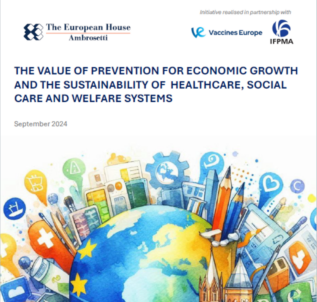IFPMA supports the Coalition for Epidemic Preparedness Innovation launched at WEF17 in Davos
The International Federation of Pharmaceutical Manufacturers and Associations (IFPMA) supports the aims of a newly formed public-private partnership to accelerate research and development of vaccines for emerging infectious diseases. The Coalition for Epidemic Preparedness Innovation (CEPI) is a direct response to calls from four independent expert reports into the Ebola epidemic for a new system for stimulating the development of vaccines against epidemic threats.
“CEPI has the potential to give the world a new line of defense against emerging epidemics, and there is a strong industry commitment from vaccine manufacturers to work with CEPI and others in the community to help meet this challenge”, said Eduardo Pisani, Director General, IFPMA. “Ebola and now Zika have demonstrated the need for vaccines to be developed before an outbreak becomes an emergency, for regulatory systems to be harmonized and simplified, and for national public health systems to be strengthened so that vaccines can rapidly reach the people who need them.”
CEPI was founded by the governments of India and Norway, the Bill & Melinda Gates Foundation, Wellcome Trust and the World Economic Forum. IFPMA member companies producing vaccines – GSK, Johnson & Johnson, MSD, Pfizer, Sanofi-Pasteur, and Takeda – are participating in CEPI, along with the World Health Organization and Médecins Sans Frontières / Doctors Without Borders, as well as philanthropies and leading academic vaccine research groups.
Rajeev Venkayya, MD, President, Global Vaccine Business Unit, Takeda Pharmaceuticals: “During the next outbreak of an emerging infectious disease, the world will demand a vaccine to protect vulnerable populations everywhere. CEPI will help to prepare for that day, by tapping into the substantial R&D capabilities across industry to create a pipeline of vaccines to address some of the most pressing threats to human health. This is an important global initiative that is applying the many lessons learned from recent outbreaks, and Takeda is proud to be a partner.”
Susan Silbermann, President and General Manager, Pfizer Vaccines: “CEPI is a critical new public-private partnership that will help prevent future epidemics by propelling new vaccine research and development. Pfizer is proud to be a part of this concerted effort between individual countries, global health organizations and pharmaceutical companies to better address emerging global infectious disease threats.”
Julie Gerberding, Executive VP, Strategic Communications, Global Public Policy, and Population Health at Merck: “Private sector vaccine companies have the capability, capacity, and commitment to protect health and wellbeing worldwide. CEPI is potentially an evolutionary leap forward in how we collectively conduct R&D into infectious diseases that come and go, posing challenges for clinical trials, for manufacturing, and for just-in-time delivery.”
Paul Stoffels, MD, Chief Scientific Officer, Johnson & Johnson: “We are delighted to be part of this exciting new public health initiative. The most recent Ebola outbreak – the worst in history – was a wakeup call that brought pandemic preparedness to the forefront and showed us how critically important an effort like this is to protecting society. As part of our commitment, we will work together with CEPI partners, regulators, and all stakeholders in forging a path forward to bring our Ebola vaccines to those in need. We are tremendously grateful for the support of the European Commission, Innovative Medicines Initiative, BARDA and NIH.”
Sir Andrew Witty, CEO of GSK said: “Finding better ways to anticipate and prepare for future health threats is one of the greatest challenges of our time. We strongly support the creation of CEPI and its focus on vaccines development as a solution to protecting against infectious disease outbreaks. GSK has developed a proposal for a Biopreparedness Organization, a dedicated and permanent facility that would use our scientific expertise and technologies to develop vaccines that could be deployed to protect citizens in the world’s poorest countries against future epidemics and pandemics. This facility would operate on a cost coverage basis to help maximize sustainable access. We stand ready to partner with CEPI to advance epidemic preparedness.”
About IFPMA
IFPMA represents the innovative pharmaceutical industry at the international level, engaging in official relations with the United Nations and multilateral organizations. Our vision is to ensure that scientific progress translates into the next generation of medicines and vaccines that deliver a healthier future for people everywhere.
ifpma.org
To achieve this, we act as a trusted partner, bringing our members' expertise to champion pharmaceutical innovation, drive policy that supports the research, development, and delivery of health technologies, and create sustainable solutions that advance global health.




